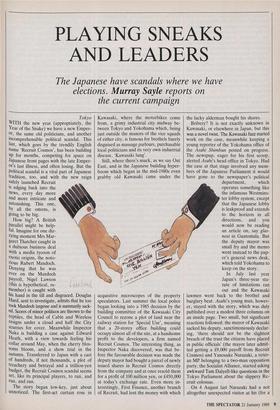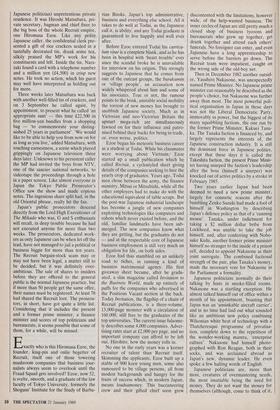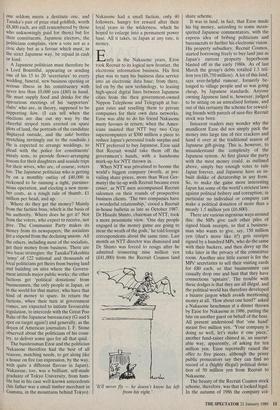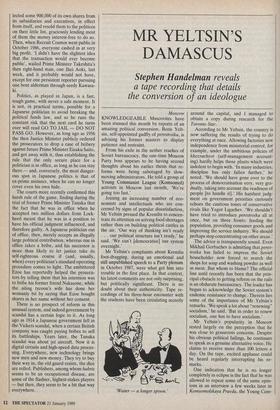PLAYING SNEAKS AND LEADERS
The Japanese have scandals where we have the current campaign
Tokyo WITH the new year (appropriately, the Year of the Snake) we have a new Emper- or, the same old politicians, and another Incomprehensible political scandal. This last, which goes by the trendily English name 'Recruit Cosmos', has been building Up for months, competing for space on Japanese front pages with the late Emper- or's last illness, and often losing. But the Political scandal is a vital part of Japanese tradition, too, and with the new reign safely launched Recruit Is edging back into the news, every day more and more intricate and astonishing. This one, by all the omens, is going to be big.
How big? A British Parallel might be help- ful. Imagine for one diz- zying moment Mrs Mar- garet Thatcher caught in a dubious business deal With a media tycoon of exotic origins, the noto- rious Rubert Maxdoch. Denying that he was ever on the Maxdoch Payroll, Nigel Lawson (this is hypothetical, re- member) is caught with his hand in the till and disgraced. Douglas Hurd, sent to investigate, admits that he too took Maxdoch largesse and is summarily sack- ed. Scores of minor politicos are thrown to the reptiles, the head of Cable and Wireless resigns under a cloud and half the City scurries for cover. Meanwhile Inspector Naka is building a case against Edward Heath, with a view towards feeling his collar around May, when the cherry blos- soms bloom, and a show trial in the autumn. Transferred to Japan with a cast of hundreds, if not thousands, a plot of treachery and betrayal and a trillion-yen budget, the Recruit Cosmos scandal seems set, like its principal players, to run, and run, and run.
The story began low-key, just about unnoticed. The first-act curtain rose in Kawasaki, where the motorbikes come from, a grimy industrial city midway be- tween Tokyo and Yokohama which, being just outside the manors of the vice squads of either city, is famous for brothels barely disguised as massage parlours, purchasable local politicians and its very own industrial disease, 'Kawasaki lung'.
Still, where there's muck, as we say Out East, and in the Japanese building hyper- boom which began in the mid-1980s even grubby old Kawasaki came under the acquisitive microscopes of the property speculators. Last summer the local police began looking into a 1985 decision by the building committee of the Kawasaki City Council to rezone a plot of land near the railway station for 'Special Use', meaning that a 20-storey office building could occupy almost all of the site, at a handsome profit to the developers, a firm named Recruit Cosmos. The interesting thing, as Inspector Naka discovered, was that be- fore the favourable decision was made the deputy mayor had bought a parcel of newly issued shares in Recruit Cosmos directly from the company and at once resold them for a profit of 100 million yen, or £450,000 at today's exchange rate. Even more in- terestingly, First Finance, another branch of Recruit, had lent the money with which the lucky alderman bought his shares.
Bribery? It is not exactly unknown in Kawasaki, or elsewhere in Japan, but this was a novel twist. The Kawasaki fuzz started work on the case, meanwhile keeping a young reporter of the Yokohama office of the Asahi Shimbun posted on progress. The newspup, eager for his first scoop, alerted Asahi's head office in Tokyo. Had the case at that stage involved any mem- bers of the Japanese Parliament it would have gone to the newspaper's political department, which operates something like the infamous Westmins- ter lobby system, except that the Japanese lobby is leakproof and extends to the horizon in all directions, and you would now be reading an article on, say glas- nost in Guatemala. But the deputy mayor was small fry and the memo went instead to the pap- er's general news desk, which told Yokohama to keep on the story.
In July last year Japan's three-year sta- tute of limitations ran out and the Kawasaki lawmen went back to the brothel and burglary beat. Asahi's young man, howev- er, stayed with the story, which was duly published over a modest three columns on an inside page. Two small, but significant reactions followed: the mayor of Kawasaki sacked his deputy, sanctimoniously declar- ing, 'there should not be the slightest breach of the trust the citizens have placed in public officials' (the mayor later admit- ted getting a £9,000 payoff from Recruit Cosmos) and Yanosuke Narazaki, a veter- an MP belonging to a two-man opposition party, the Socialist Alliance, started asking awkward Tam Dalyell-like questions in the Tokyo Parliament about the slippery Re- cruit colossus.
On 4 August last Narazaki had a not altogether unexpected visitor at his (for a Japanese politician) unpretentious private residence. It was Hiroshi Matsubara, pri- vate secretary, bagman and chief fixer to the big boss of the whole Recruit empire, one Hiromasa Ezoe. Like any polite Japanese caller, the confidential clerk pre- sented a gift of rice crackers sealed in a tastefully decorated tin, drank some tea, silkily praised the MP's work for his constituents and left. Inside the tin, Nara- zaki found a card with a telephone number and a million yen (£4,500) in crisp new notes. He took no action, which his guest may well have interpreted as holding out for more.
Three weeks later Matsubara was back with another well-filled tin of crackers, and on 3 September he called again, by appointment, to present what he called 'an appropriate sum' — this time £22,500 in five million-yen bundles from a shopping bag — to commemorate your disting- uished 25 years in parliament'. 'We would like to be able to help you from now on for as long as you live,' added Matsubara, with touching earnestness, a scene which played grippingly on Japanese television three days later. Unknown to his persistent caller the MP had invited the boys from NTV, one of the saucier national networks, to videotape the proceedings through a hole in a paper screen. Like almost everyone in Japan the Tokyo Public Prosecutor's Office saw the show and made copious notes. The ingenious share split had, in the old Oriental phrase, really hit the fan.
Japan's public prosecutors descend directly from the Lord High Executioner of The Mikado who was, G and S enthusiasts will recall, in deep trouble because he had not executed anyone for more than two weeks. The prosecutors, dedicated work- ers as only Japanese can be when let off the lead, have not managed to jail a political or business biggie for more than ten years. The Recruit bargain-stock scam may or may not have been legal, a matter still to be decided, but it was definitely over- ambitious. The sale of shares to insiders before they are offered to the general public is the normal Japanese practice, but if more than 50 people get the same offer, their names must be registered. At least 78 had shared the Recruit loot. The prosecu- tors, in short, have got quite a little list. Considering that it includes the present and a former prime minister, a finance minister and scores of top politicians and bureaucrats, it seems possible that some of them, for a while, will be missed.
Exactly who is this Hiromasa Ezoe, the founder, king-pin and onlie begetter of Recruit, itself one of those towering mushroom companies that business jour- nalists always seem to overlook until the Fraud Squad gets involved? Ezoe, now 52, is svelte, smooth, and a graduate of the law faculty of Tokyo University, formerly the Shoguns' Institute for the Study of Barba-
rian Books, Japan's top administrative, business and everything else school. All it takes to do well at Todai, as the Japanese call it, is ability, and any Todai graduate is guaranteed to live happily and well ever after.
Before Ezoe entered Todai his curricu- lum vitae is a complete blank, and as he has been in hospital with 'heart trouble' ever since the scandal broke he is unavailable for interview on his origins. This strongly suggests to Japanese that he comes from one of the outcast groups, the burakumin or 'village people', an accusation now widely whispered about him and some of his associates. True or not, the rumour points to the brisk, unstable social mobility the torrent of new money has brought to snobbish Japanese society. Much as in Victorian and neo-Victorian Britain the upstart mega-rich are simultaneously fawned on for their influence and patro- nised behind their backs for being in trade, or, even worse, politics.
Ezoe began his meteoric business career as a student at Todai. While his classmates were worrying about Vietnam: Ezoe started up a small publication which he called Recruit, a cyclostyled sheet giving details of the companies seeking to hire the yearly crop of graduates. Years ago, Todai men chose between the army, the finance ministry, Mitsui or Mitsubishi, while all the other employers had to make do with the educational equivalent of table scraps. But the post-war Japanese industrial landscape has become a jungle of new companies exploiting technologies like computers and robots which never existed before, and the old, familiar landmarks have been sub- merged. The new companies know what they are getting, but the graduates do not — and at the respectable core of Japanese business employment is still very much an obligation for life, on both sides.
Ezoe had thus stumbled on an unlikely road to riches, in running a kind of business matrimonial agency. His first giveaway sheet became, after he gradu- ated, a slim magazine called Invitation to the Business World, made up entirely of puffs for the companies who advertised in the Positions Vacant section at the back. Today Invitation, the flagship of a chain of Recruit publications, is a three-volume, 13,000-page monster with a circulation of 160,000, still free to the graduates of the top universities. The current issue fulsome- ly describes some 4,000 companies. Adver- tising rates start at £2,000 per page, and no important company can afford to be left out. Hirohito, how the money rolls in.
No one in the early years was a keener recruiter of talent than Recruit itself. Skimming the applicants, Ezoe built up a stable of 900 keen young men, some also rumoured to be village persons, all from modest backgrounds and hungry for the fruits of success which, in modern Japan, means loadsamoney. This buccaneering crew and their gifted chief soon grew discontented with the limitations, however wide, of the help-wanted business. The inner circles of Japan are still pretty much a closed shop of business tycoons and bureaucrats who grew up together, get drunk together and attend each others' funerals. No foreigner can enter, and even Japanese have a long apprenticeship to serve before the barriers go down. The Recruit team were impatient, caught on the wrong side of the old-boy net.
Then in December 1982 another outsid- er, Yasuhiro Nakasone, was unexpectedly named Prime Minister. No Japanese prime minister can reasonably be described as the people's choice, but Nakasone was further away than most. The most powerful poli- tical organisation in Japan in those days was not the Liberal Democratic Party, immovably in power, but the biggest of its many squabbling factions, the one run by the former Prime Minister, Kakuei Tana- ka. The Tanaka faction is financed by, and largely represents the interests of, the Japanese construction industry. It is still the dominant force in Japanese politics, except that these days it is called the Takeshita faction, the present Prime Minis- ter having usurped the faction's leadership after the boss (himself a usurper) was knocked out of active politics by a stroke in February 1985.
Two years earlier Japan had been deemed to need a new prime minister, largely for cosmetic reasons after the bumbling Zenko Suzuki had made a fool of himself in Washington by describing Japan's defence policy as that of a 'cunning mouse'. Tanaka, under indictment for taking a $2 million dollar bribe from Lockheed, was unable to take the job himself, and, after conferring with Nobo- suke Kishi, another former prime minister himself no stranger to the inside of a prison cell, decided to appoint Nakasone as their joint surrogate. The combined factional strength of the pair, plus Tanaka's money, made the necessary vote for Nakasone in the Parliament a formality.
Japanese politicians normally do their talking by hints in smoke-filled rooms. Nakasone was a startling exception. He almost talked himself out of office within a month of his appointment, boasting that Japan was an 'unsinkable aircraft carrier', and in no time had laid out what sounded like an ambitious new policy combining Wilsonian white heat of technology with a Thatcheresque programme of privatisa- tion, complete down to the repetition of the wonder-working mantra, 'enterprise culture'. Nakasone had himself photo- graphed with Ron Reagan, both in their socks, and was acclaimed abroad as Japan's new, dynamic leader. He even spoke a few halting words of English.
Japanese politicians are, more than most, creatures of overmastering needs, the most insatiable being the need for money. They do not want the money for themselves (although, come to think of it, one seldom meets a destitute one, and Tanaka's pair of prize stud goldfish, worth £8,800 each, are still remembered by those who unknowingly paid for them) but for their constituents. Japanese electors, the Politicians complain, view a vote not as a civic duty but as a favour Which must, in the strict Japanese way, be repaid in cash or kind.
A Japanese politician must therefore be a Lord Bountiful, appearing or sending one of his 15 to 20 'secretaries' to every wedding, funeral, new business opening or serious illness in his constituency with never less than 10,000 yen (180) in hand. He must supply food and drinks for the Uproarious meetings of his 'supporters' Clubs' who are, in theory, supposed to be supporting him. (I can tell when the elections are due out my way by the cheerful striped tents erected on spare Plots of land, the portraits of the candidate displayed outside, and the sake bottles stretching invitingly out to the roadside.) He is expected to arrange weddings, to Plead With the police for constituents' unruly sons, to provide flower-arranging lessons for their daughters and seaside trips for their wives, who are, of course, voters too. The Japanese politician who is getting by on a monthly outlay of £40,000 is reckoned to be running a tight, parsimo- nious operation, and electing a new mem- ber costs, as a rough rule of thumb, £1 million per head, and up.
Where do they get the money? Mainly from the faction boss, which is the basis of his authority. Where does he get it? Not from the voters, who expect to receive, not give. The Communist Party makes its money from its newspapers; the socialists get a stipend from the declining unions. All the others, including most of the socialists, get their money from business. There are two basic strategies; the Tanaka/Takeshita 'army' of 122 national and thousands of local politicians get theirs from buying land and building on sites where the Govern- ment intends major public works; the other factions get 'political donations' from businessmen, the only people in Japan, or in the world for that matter, who have that kind of money to spare. In return the factions, when their turn at government comes, are expected to initiate favourable legislation, to intercede with the Great Poo Bahs of the Japanese bureaucracy (G and S Spot on target again!) and generally, as the doyen of American journalists I. F. Stone Observed about the politicians of his coun- try, to deliver some quo for all that quid.
The businessman Ezoe and the politician Nakasone therefore had the best of all reasons, matching needs, to get along like a house on fire (an expression, by the way, With quite a different flavour in Japan). Nakasone, too, was a brilliant, self-made graduate of Tokyo University, from hum- ble but in his case well-known antecedents (his father was a small timber merchant in Gumma, in the mountains behind Tokyo). Nakasone had a small faction, only 40 followers, hungry for reward after their loyal years in the wilderness, which he hoped to enlarge into a permanent power base. All it takes, in Japan at any rate, is money.
any in the Nakasone years, Ezoe took Recruit to its logical new frontier, the electronic information business. His first plan was to turn his business data service into an electronic data base; from there, led on by the new technology, to leasing high-speed digital lines between Japanese cities from the then government-owned Nippon Telephone and Telegraph at bar- gain rates and reselling them to private companies for their own data networks. Ezoe was able to do his friend Nakasone many favours in return; when the Amer- icans insisted that NTT buy two Cray supercomputers at $300 million a piece to reduce Japan's perennial trade surplus and NTT preferred to buy Japanese, Ezoe said that Recruit would take them off the government's hands, with a handsome mark-up for NTT thrown in.
When NTT was privatised to beome the world's biggest company (worth, at pre- vailing share prices, more than West Ger- many) the tie-up with Recruit became even cosier, as NTT men accompanied Recruit salesmen on their rounds of prospective business clients. 'The two companies have a wonderful relationship,' cooed a Recruit in-house bulletin as late as October 1987. Dr Hisashi Shinto, chairman of NIT, took a more pessimistic view. 'One day people engaged in the money game are going to incur the wrath of the gods,' he told foreign correspondents about the same time. Last month an NTT director was dismissed and Dr Shinto was forced to resign after he admitted trousering nine million yen (£41,000) from the Recruit Cosmos land 'It'll never fly — he doesn't know his left from his right.' share scheme.
It was in land, in fact, that Ezoe made his big money, according to some mean- spirited Japanese commentators, with the express idea of bribing politicians and bureaucrats to further his electronic vision. His property subsidiary, Recruit Cosmos, started borrowing freely to buy land just as Japan's current property hyperboom blasted off in the early 1980s. As of last March the group's debts totalled 1.5 tril- lion yen (£6,750 million). A lot of this land, says ever-helpful rumour, formerly be- longed to village people and so was going cheap, by Japanese standards. Anyone owning Japanese land is, however, judged to be sitting on an unrealised fortune, and out of this certainty the scheme for reward- ing friends with parcels of sure-fire Recruit stock was born.
Innocent readers may wonder why the munificent Ezoe did not simply pack the money into large tins of rice crackers and hand it over at the traditional season of Japanese gift-giving. This is, however, to misunderstand the complexity of the Japanese system. At first glance the party with the most money could, as outlined above, simply buy enough votes to rule Japan forever, and Japanese have an in- built dislike of dictatorship in any form. So, to make the game more interesting Japan has some of the world's strictest laws against political bribery and corruption; in particular no individual or company can make a political donation of more than a measly 1.5 million yen (£6,600).
There are various ingenious ways around this: the MPs give each other piles of signed blank receipts, so that a business- man who wants to give, say, 150 million yen (that's more like it!) gets receipts signed by a hundred MPs, who do the same with their backers, and then divvy up the take later in the privacy of the committee room. Another nice little earner is for the MPs' secretaries to sell their visiting cards for £80 each, so that businessmen can casually drop one and hint that they have connections 'upstairs'. The trouble with these dodges is that they are all illegal, and the political world has therefore developed a bizarre jargon which avoids mentioning money at all. 'How about one hand?' asked a Nakasone henchman at a dinner thrown by Ezoe for Nakasone in 1986, putting the bite on another guest on behalf of the boss. All present understood that 'one hand' meant five million yen. 'Your company is doing so well, let's make it one piece,' another fund-raiser chimed in, an inscrut- able way, apparently, of asking for ten million yen. Ezoe reportedly raised the offer to five pieces, although the prissy public prosecutors say they can find no record of a (highly illegal) political dona- tion of 50 million yen from Recruit to Nakasone.
The beauty of the Recruit Cosmos stock scheme, therefore, was that it looked legal. In the autumn of 1986 the company col- lected some 900,000 of its own shares from its subsidiaries and executives, in effect from itself, and resold them to the politicos on their little list, graciously lending most of them the money interest-free to do so. Then, when Recruit Cosmos went public in October 1986, everyone cashed in at very big profit. 'I didn't have the slightest idea that the transaction would ever become public', wailed Prime Minister Takeshita's then right-hand man, one Ihei Aoki, last week, and it probably would not have, except for one persistent reporter pursuing one bent alderman through seedy Kawasa- ki.
Politics, as played in Japan, is a fast, tough game, with never a safe moment. It is not, in practical terms, possible for a Japanese politician to avoid breaking the political funds law, and so he runs the constant risk that the next card he turns over will read GO TO JAIL — DO NOT PASS GO. However, as long ago as 1956 the then Justice Minister publicly ordered the prosecutors to drop a case of bribery against future Prime Minister Eisaku Saito, and got away with it, thus establishing the rule that the only secure place for a politician is in office, as long as he can stay there — and, conversely, the most danger- ous spot in Japanese politics is that of ex-prime minister, when he can no longer cover even his own hide.
The courts more recently confirmed this harsh rule of the game, finding during the trial of former Prime Minister Tanaka that the fact that he was in office when he accepted two million dollars from Lock- heed meant that he was in a position to have his official judgment influenced, and therefore guilty. A Japanese politician out of office, then, merely accepts an illegally large political contribution, whereas one in office takes a bribe, and his successor is more than likely to let justice take its self-righteous course if (and, usually, when) every politician's standard operating procedure comes to light. The embittered Ezoe has reportedly helped the prosecu- tors by telling them that his intention was to bribe his former friend Nakasone, while the ailing tycoon's wife has done her womanly bit by saying that Ezoe bought shares in her name without her consent.
There is no prospect of reform in this unusual system, and indeed government by scandal has a certain logic to it. As long ago as 1914 a Japanese government fell in the Vickers scandal, when a certain British company was caught paying bribes to sell its battleships. Years later, the Tanaka scandal was about jet aircraft. Now it is digital circuits and high-speed data proces- sing. Everywhere, new technology brings new men and new money. They try to buy their way in, the old guard resists, the dice are rolled. Publishers, among whom hubris seems to be an occupational disease, are some of the flashier, highest-stakes players — but then, they seem to be a bit that way everywhere.





























































 Previous page
Previous page